
Founded in 2013, DoorDash is a food delivery service. It’s also the latest startup to be eying a valuation of more than $1 billion. DoorDash already raised $40 million in March; according to Bloomberg, it may soon reap another round of funding that would put the company in the same lofty territory as Uber, Airbnb, and more than 100 other so-called unicorns.
Not that DoorDash is doing anything terribly original. Startups bringing food to your door are everywhere. There’s Instacart, which wants to shop for groceries for you. Deliveroo and Postmastes, like DoorDash, are looking to overtake Seamless as the way we get takeout at home. Munchery, SpoonRocket, and Sprig offer pre-made meals. Blue Apron, Gobble, HelloFresh, and HomeChef deliver ingredients to make the food ourselves. For the moment, investors are giddily rushing to subsidize this race to our doors. But skeptics say that the payout those investors are banking on might never come.
Like The Last Time
Even in a crowded field, funding for these delivery startups continues to grow. CB Insights, a research group that tracks startup investments, said this summer that the sector was “starting to get a little crowded.” Last year, venture-backed food delivery startups based in the US reaped more than $1 billion in equity funding; during first half of this year, they pulled in $750 million more, CB Insights found.
The enormous waves of funding may prove money poorly spent if Silicon Valley finds itself in a burst bubble. Bill Gurley, the well-known investor and a partner at venture firm Benchmark, believes delivery startups may soon be due for a rude awakening. Unlike the first dotcom bubble, he said, smartphones might offer help, because startups are able to collect more data. But he compared the optimism investors are showing for such low-margin operations to the misplaced enthusiasms of 1999. “It’s the same shit,” Gurley said during a recent appearance. (Gurley’s own investment in food delivery service, GrubHub, went public in April 2014 and is now valued at more than $2.2 billion.)
Gurley is not the only one who remembers the lessons of the last decade—or has worries about what appears to be the latest display of irrational exuberance. “A food startup is different from a tech startup because of the complicated emotional relationship between humans and their food,” Robyn Metcalfe, a food historian at the University of Texas at Austin, opined earlier this year in TechCrunch. Meanwhile, the upstarts will have to contend with tech giants who are also getting into the food field as well—be it Google with Shopping Express, Amazon with AmazonFresh, or Uber with its food delivery service.
“The history of venture investment in home delivery is littered with ghastly mistakes,” says Harvard Business School professor John Deighton, pointing to Webvan and other cautionary examples from the first dotcom bubble.
And Yet
The world today isn’t the same as 1999. While Webvan was dependent on employees and expensive warehouses, DoorDash operates with contractors and delivers food from restaurants. “Will things be different this time?” Deighton asks. “Well, of course, the fixed costs are lower thanks to the bring-your-own-car part-time labor market pioneered by Uber.”
Still, he says the on-demand parallel only holds up so far. “The demand for taxis was never in doubt. The demand for food delivery is not so clear.” Only 9 percent of most markets (“Manhattan excepted,” he says) have ever exhibited sustained demand for home delivery at any price above free.
Harvard Business School professor Josh Lerner argues that in addition to the question of demand, the food delivery startups of today could face the same kind of regulatory concerns as their on-demand brethren. If they have to start paying benefits and providing health insurance to their employees instead of labeling them as independent contractors, it’s unclear if such low margin business will be able to survive. “It could impact the economics of these enterprises in a way that might be challenging.” (In fact, DoorDash has already been sued for classifying its workers as contractors.)
Investors, meanwhile, say these delivery upstarts will help Americans eat healthier, faster, and more efficiently with the push of a button. They say technology makes it easier to deliver food cost-effectively while minimizing labor costs. Food will be disrupted, they say, like everything else. With that promise—and the hope that some of these startups can ultimately deliver—the money keeps pouring in.
